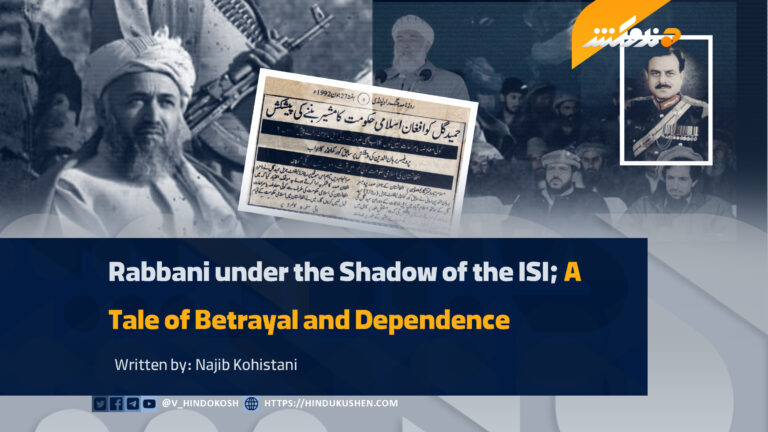Written by: Najib Kohistani
Burhanuddin Rabbani; a figure who, amidst the civil wars, while the blood of the innocent killed in these wars had not yet dried from his hands, ascended to the presidency and declared himself the president of Afghanistan; a country that at that time, due to the betrayal and power-seeking of these very individuals, was nothing more than a devastated ruin.
Rabbani, who ignited the flames of civil wars after the collapse of the communist government due to his lust for power, was appointed as the head of the Afghan High Peace Council in the final years of his life, under the shadow of the occupiers and their puppet government; a warlord who, with a shameful record, sought to whitewash himself.
Burhanuddin and other warlords involved in the civil wars, while calling themselves representatives of the Afghan nation, led the country to the brink of destruction and misery due to their party and movement differences; a mission that was assigned to them by their foreign masters, including Pakistan’s ISI.
Looking at the slogans of these individuals, they outwardly spoke even more negatively about Pakistan’s oldest enemy, India, calling the country the reason for all the problems, which were actually primarily caused by their own incompetence.
Pakistan’s prominent role, especially that of General Hamid Gul, the head of the country’s ISI, in the policies of these warlords is not a hidden secret, but a clear and obvious truth; a truth that has been repeatedly addressed by Pakistani newspapers, including “Jang Rawalpindi” and “Frontier Post.”
A clipping from the Rawalpindi edition of the newspaper “Jang” (June 27, 1992) states: “During a meeting with General Hamid Gul in Islamabad, the President of Afghanistan, Professor Burhanuddin Rabbani, praised his services and asked him to come to Kabul and serve as an advisor to the Islamic Republic of Afghanistan. General Hamid Gul, while thanking the President of Afghanistan, said he would not accept any reward…
The Pakistani newspaper “Frontier Post” also confirms the depth of Rabbani’s political and military dependence on Pakistan in a report titled “Rabbani may ask General Hamid Gul to reestablish the army” (July 3, 1992).
The newspaper writes: “On Thursday night [July 2, 1992], the BBC reported that Afghan President Burhanuddin Rabbani indicated he would use the services of General Hamid Gul, the former head of Pakistan’s military intelligence – ISI, to reorganize the Afghan army.”
This evidence clarifies how a wounded Afghanistan, at its peak need for unity and independence, became a testing ground for intelligence operations and mercenary power grabs.
The overt and covert dependence of warlords on external circles not only failed to quell the flames of civil wars but also dashed the hopes of the people for a peaceful and free future – a future that, at the cost of the blood of thousands of innocent people, became a pawn in the hands of power brokers.
Note: The articles, essays, and comments published by the Voice of Hindukush only reflect the views of the authors & writers and do not necessarily represent the agreement of the Voice of Hindukush.




